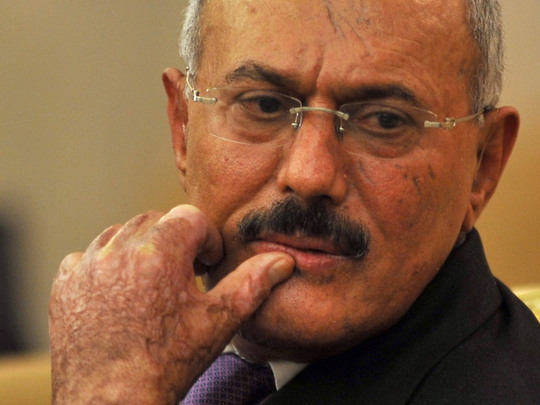
Sana’a: Five bodyguards of the former Yemeni president Ali Abdullah Saleh were arrested on Tuesday in connection with a plot to kill him through a tunnel under his residence, a local newspaper reported on Wednesday.
The Supreme Security Committee said on Tuesday that it launched an investigation into a 88-metre tunnel dug under the house of Saleh in the capital. The Minister of Interior and senior intelligence officials visited the site of the tunnel in a hangar north of Saleh’s home.
Yemen Today newspaper, the mouthpiece of the former president, said that the five soldiers’ role was distracting people’s eyes away from the hanger by safeguarding the workers digging the tunnel. The newspaper said the police also arrested some workers who dug the tunnel.
Saleh’s party issued a statement on Tuesday claiming that those people who dug the tunnel were attempting to assassinate Saleh, his family and bodyguards in order to “ blow up the political process and social peace”.
No one has claimed responsibility for the excavations, but members of Saleh’s party accused an Islamist party and tribal figures of plotting to kill Saleh.
Abdullah Hashim Al Hadharmi, the editor of Yemen Today, told the Gulf News that Saleh ordered supporters to exercise self-restraint and wait for the findings of the investigations. Al Hadharmi believes that the same people who allegedly tried to kill Saleh in 2011 are responsible for this plot.
“The Islah party and the sons of Al Ahmer are behind his plot. They are aimed at destroying the transitional period and the outcomes of the national dialogue.”
The Islah party and the Al Ahmer tribe usually deny their involvement in any plot against Saleh.
Saleh narrowly escaped death in 2011 when an explosion ripped though his presidential compound as he was struggling to stay in power. He quickly pointed figure of blame to the Islamist Islah party and their allied the Al Ahmer tribe.
Early this month, the former president complained to the UN Sanctions Committee that his party is facing a “systematic and “deliberate” process to exclude them from their positions. He also said that he that he had no intention to go back to power.
The Sanctions Committee was formed on February in the wake of the UN Resolution 2140 (2014) that threatened to impose sanctions on the powerful Yemeni forces that impede the transitional process in the country. The committee was assigned to monitor the implementation of the resolution and alert the UNSC about the spoilers. The committee met with Saleh and other forces that opposed his regime.
Yemen’s long-serving Saleh ruled the country from 1978 to 2012 and was forced to leave office following Arab-Spring inspired protests. Saleh handed over power to his then deputy Abd Rabbu Mansour Hadi under a UN- and Gulf-brokered peace initiative.












